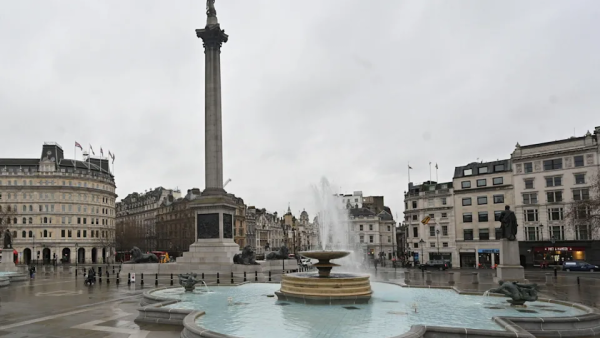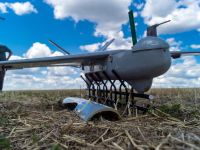The head of NHS Test and Trace today warned Britons not to socialise before Christmas 'unless you need to' in a noticeable shift in tone as the mutant Omicron strain was detected in three more people in Scotland, bringing the UK's total to 14.
Dr Jenny Harries, one of No10's top public health experts, issued the stark warning as she admitted that the mutant could have a 'significant impact on our hospitals' because existing vaccines are expected to be significantly less effective.
She hinted that WFH is already being considered within Government and could be the next measure to be reintroduced if the outbreak starts to grow, adding: 'If we see surges, then working from home will be a good thing to do.'
The Government's new rules on face masks and self-isolation to slow the spread of the variant came into effect in England from 4am this morning, with coverings now compulsory on public transport, in shops, beauty salons and hairdressers.
Britain alarmed by new COVID-19 variant spreading in South Africa https://t.co/rbmDCY9tkZ
— Healthcare-Global? (@HealthcareGlob1) November 30, 2021
But Labour's London Mayor Sadiq Khan today urged people in the capital to go one step further and wear face masks in pubs and restaurants, deviating from official guidance.
Nationally, the restrictions are to be reviewed again in three weeks, which means Britons could be stung with last-minute curbs just days before Christmas.
In a round of interviews, Mr Khan said: One of my requests from the Government is, let's not have a hokey cokey when it comes to face mask-wearing where they're going to review it in three weeks' time.
'As far as I'm concerned, on public transport — because more often than not we've got to be confined, we can't keep our social distance — let's keep it at mandatory with the ability to back it up with the police, with the ability to issue fines even in three weeks' time, finger crossed, should Omicron not be as bad as some fear.'
Boris Johnson will hold a Downing Street press conference at 4pm this afternoon to outline how to book booster jabs amid fears the top-up drive will not be able to keep up with ministers' demands for at least 500,000 a day.
NHS leaders today demanded the Army be called back in to help administer the target after GPs warned No10 that some face-to-face appointments with patients will have to go if they are expected to help.
Good point... https://t.co/wPlJuqBiRO
— UK COVID nightmare #KBF #RejectBadScience (@AntiWokeBritain) November 30, 2021
The Government's vaccines advisers have expanded the rollout to everyone aged over 18 despite those already eligible struggling to get one before Christmas or having to travel 35 miles or more to their nearest vaccination centre.
Scientists say it will take two weeks to truly work out how effective jabs are against Omicron, which has twice as many mutations on its spike protein as Delta. The strain is expected to make current vaccines significantly weaker at preventing infections, but it's less clear how it will impact hospitalisations and deaths.
Britain yesterday expanded its current booster rollout for all adults over 18. Even though the vaccines are expected to be much weaker against Omicron, it is hoped that topping up everyone's immunity to very high levels will offer an extra line of defence against the incoming wave.
The Prime Minister's official spokesperson slapped down Dr Harries's urge to the public to stop socialising. Asked if it was as a view Mr Johnson shared, they said: 'No. Our advice to the public is as set out at the weekend.
'We have put advice out on face coverings and on inward travellers and those who are identified as having the Omicron variant of coronavirus. Beyond that we haven’t set out any further guidance to the public.'
On another day of Covid chaos:
- The crackdown on mask-flouters in London began today as Tube officials threatened to fine non-compliant commuters £200 if they refuse to cover their faces;
- Winter holiday plans for thousands of Britons were thrown into chaos after Switzerland suddenly tightened Covid entry rules over fears of the Omicron variant;
- Data revealed the South African province where the Omicron Covid variant was first detected has suffered a more than 300 percent increase in virus related hospitalisations this week;
- Vaccine maker Moderna warned it will take months to develop an Omicron-specific booster;
- Nicola Sturgeon slammed the brakes on restrictions easing in Scotland;
- Retail bosses warned that they cannot be expected to enforce new facemask rules in shops;
- Universities, colleges and secondary schools in Wales have been told they should now enforce masks indoors.
The Prime Minister this morning defended England's new coronavirus rules, which he claimed are 'proportionate and responsible'.
'The measures taking effect today are proportionate and responsible, and will buy us time in the face of this new variant,' he said. 'Vaccines and boosters remain our best line of defence, so it is more important than ever that people come forward when eligible to get boosted.'
Also, check out our latest UK film about the impact of COVID on Britain’s minorities.
— Flo Phillips (@phillipsflo) November 30, 2021
?Watch The Big Picture: Britain’s True Colours - here ??https://t.co/NXyg421DcQ pic.twitter.com/e9woOt2gku
Professor Paul Moss, a member of the Scientific Advisory Group for Emergencies (SAGE), said that scientists are 'well prepared' to tweak the vaccines in the event that the Omicron variant evades the protection afforded by the current vaccines. AstraZeneca on Saturday said it has developed a platform to allow it to 'quickly respond' to any emerging variants, including Omicron.
Scottish health authorities announced three more Omicron cases overnight, bringing Scotland's total to nine spread between Glasgow and Lanarkshire.
The UK's total is 14, with five further cases found in Nottingham, Brentwood, Camden, Wandsworth and Westminster. Labs across the country are probing hundreds more probable cases and there are signs the strains already spreading in the community.
UK Health Security Agency (UKHSA) chief executive Dr Harries today told BBC Radio 4's Today programme that the advice from the Scientific Advisory Group for Emergencies (SAGE) 'has shown that if we have significant surges in Covid cases, then actually working from home is one of the key ones to implement and that's why it is in Plan B'.
'But it's probably worth just thinking through at the moment; although I'm sure we will have more cases announced, we do only have five confirmed cases (of the new Omicron variant in England) and 10 highly probable at the moment.
'So it's a very early stage for this, I think, but certainly, if we see surges, then working from home will be a good thing to do.'
Word 'Christmas' is 'BLOCKED from government Covid ad encouraging students to get tested as it's not inclusive enough'
— McD (@mcdam2021) November 29, 2021
Not acceptable in 2021 Britain.
@BorisJohnson @Jacob_Rees_Mogg @michaelgove @Conservatives https://t.co/XuL2aF5c8K
But asked about whether Dr Harries had raised the return of the work-from-home guidance in cabinet meetings, the Prime Minister's official spokesperson today told MailOnline
They said: 'That wasn’t something she raised at Cabinet, no. It is not our advice to the public currently.
‘You will know the measures we set out at the weekend. We have Plan B as you say, that is well worked up, those plans can be brought in if required.
‘But currently there is nothing in the data and given what we currently know about this variant and indeed what we do not know we believe our approach as set out at the weekend is the proportionate and responsible one.'
Speaking earlier about vaccine effectiveness, Dr Harries said it is highly likely that the UK's vaccination programme will be beneficial in the face of the Omicron variant but experts also expect vaccine effectiveness to be reduced.
She said the current understanding is that the booster will 'shoot up your immunity levels and so getting that high background level of immunity on a population basis may, to some extent, counter the reduced effectiveness against this particular variant'.
She added that there is a need to 'be really careful about interpreting the data' after suggestions from South Africa that the variant is causing mild illness, saying that the UK has an older population, with an average age of 41, compared with 27 in South Africa.
Meanwhile, Mr Khan hinted that coverings might need to be extended to hospitality settings at a later date if the so-called 'Omicron' variant is worse than feared.
In an interview with Sky News this morning, he urged: 'If you're in a pub, bar or restaurant, particularly if you're standing up in one of those bars rather than at a table, and you can't keep your distance, and you're not drinking, wear a facemask.'
It comes after Health Minister Gillian Keegan today insisted it is better for the UK to 'overreact than underreact' to the new Omicron coronavirus variant after Joe Biden told the US the mutant strain is 'not a cause for panic'.
A race to save the Christmas dinner by bringing more foreign butchers into Britain is at risk of being derailed by surging Covid cases across Europe, meat bosses have said https://t.co/caOOL1Ds3Q
— The Telegraph (@Telegraph) November 28, 2021
Ms Keegan said ministers are trying to strike the right 'balance' in the response but she admitted it is a difficult judgment to make because there are many 'unknowns' associated with the variant.
All travellers returning to the UK must now take a PCR test on or before day two after their arrival. They can leave isolation once they have a negative test result.
Close contacts of Omicron cases must isolate at home for ten days regardless of whether they are vaccinated or not, prompting fears of another 'pingdemic'.
Ms Keegan insisted 'Christmas is on track' amid fears the Omicron variant could result in more people having to self-isolate over the festive period.
Last night US President Mr Biden said that 'this variant is a cause for concern, not a cause for panic'.
His comments prompted scrutiny of the UK's response, which has seen ministers roll out three main curbs to buy scientists some time as they race to analyse the new variant and assess how effective existing vaccines will be against it.
Ms Keegan was asked during an interview on Sky News if the UK is in danger of overreacting.
She replied: 'We are trying to get that balance and proportion and it is difficult because it is unknown so we need to buy some time so our scientists can work with the world's leading scientists to just basically figure out, we know it is very transmissible by looking, but we don't know whether it'll work with the vaccine, the vaccine will work, or the other treatments et cetera.
'So the scientists do need some time for that. We think we have got the balance and the proportional response to it. But we will review it in three weeks, that will give the scientists enough time to hopefully give us some insights then.'
Told that it could subsequently become apparent that the UK has overreacted, Ms Keegan said: 'I would rather overreact than underreact at this point.
'I think we have been here so many times that, you know, we have got this fantastic wall of vaccine now, we want to keep that, we want to strengthen it.
'We would rather be stronger to be able to face any new variants and I think we have all the things, all the capability to do that, so that is what we would rather do.'
The new self-isolation rules for people identified as a close contact of an Omicron case has sparked concerns of a potential 'pingdemic' at Christmas, should the variant surge in the UK in the coming weeks.
Told that the restrictions could result in more people being unable to see their family over the Christmas period, Ms Keegan said: 'Obviously you could be self-isolating over Christmas. You could be. But what we are hoping is we keep these cases, obviously everybody is going to be contacted, people will start the isolation.
'With or without this you could be isolating for Christmas, with another variant.
'Of course Christmas is on track. What everyone wants for Christmas is if you haven't had your first jab, come and get it, if you haven't had your second jab, come and get it, and if you haven't had your booster, come and get it when you are asked.'
Ms Keegan said that Christmas will 'hopefully not' be ruined, adding: 'Let's be proportional and balanced as we are trying to be, we have got five cases today, that will go up I am pretty sure, but what we are trying to do is really clampdown on that as much as possible.'
Meanwhile, asked about the prospect of Christmas plans being called off, Professor Paul Moss, of the Institute of Immunology and Immunotherapy at the University of Birmingham, told Sky News: 'I don't think we need to worry too much about that at this stage... the measures that we got in place have a good chance of gaining some control here.
'The two ways that we're adopting to try and control this are: one, in behavioural change to reduce transmission: the travel restrictions; more lateral flows; masking.
'And the second big factor is the immunity and we know that we may lose some immunity with this virus. So what is happening is we are boosting our immune levels to super-high levels with the plans that were introduced yesterday, and that should retain some protection.
'What we've seen with Covid is that things change very rapidly. And I think we need at least three weeks to assess this.
'We need excellent epidemiology and within the laboratory people are testing the resistance of the virus against vaccinated samples. So we will need that sort of time. And we will know a lot more before Christmas.'
He added: 'You probably saw that the doctor in South Africa who initially identified it had seen relatively mild cases, which is very encouraging. However, you know, that's a much younger population.
'It's the elderly population, we need to worry about - in South Africa only six per cent are above 65 years whereas we've got a much higher proportion.'
Professor Moss insisted vaccine manufacturers should be able to produce new jabs tailored to the variant quickly.
He said: 'Well, as you know, the companies have already started — the gene has been cloned, but typically talking around 100 days.
'We've learned so much in the last 18 months — nobody felt we would get a vaccine within a year when the pandemic started, and we did — we got several.
'So it will be accelerated and, of course, if we were in that severe situation — but I really hope that we won't get to, by the way — we're very well prepared. We know what to do.'
Professor Adam Finn, a member of the Joint Committee on Vaccination and Immunisation, said that the UK had to 'act immediately and not wait' after the discovery of the Omicron variant.
He told BBC Breakfast: 'The main question is whether it's able to evade the immunity that we've got to some extent from the vaccine so far and the infections we've all had.
'And so because of that, and because of the possibility of a major wave, the thing to do now is to act immediately and not wait.'
This article has been adapted from its original source.








